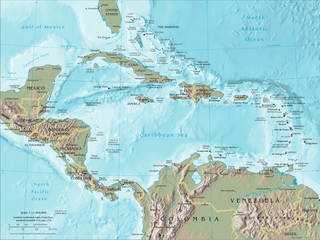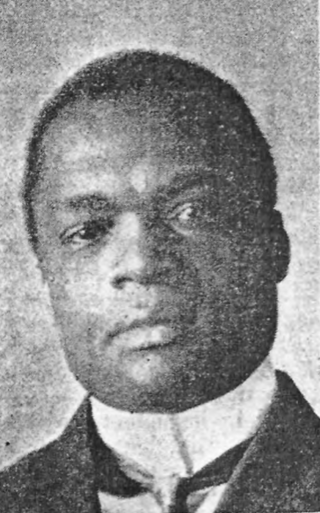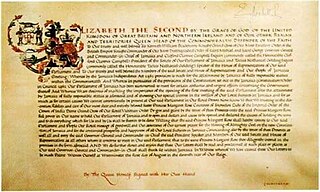The history of Trinidad and Tobago begins with the settlements of the islands by Indigenous First Peoples. Trinidad was visited by Christopher Columbus on his third voyage in 1498,, and claimed in the name of Spain. Trinidad was administered by Spanish hands until 1797, but it was largely settled by French colonists. Tobago changed hands between the British, French, Dutch, and Courlanders, but eventually ended up in British hands following the second Treaty of Paris (1814). In 1889, the two islands were incorporated into a single political entity. Trinidad and Tobago obtained its independence from the British Empire in 1962 and became a republic in 1976.
Barbados is an island country in the southeastern Caribbean Sea, situated about 100 miles (160 km) east of Saint Vincent and the Grenadines. Roughly triangular in shape, the island measures some 21 miles (34 km) from northwest to southeast and about 14 miles (23 km) from east to west at its widest point. The capital and largest town is Bridgetown, which is also the main seaport.

The Danish West Indies or Danish Virgin Islands or Danish Antilles were a Danish colony in the Caribbean, consisting of the islands of Saint Thomas with 32 square miles (83 km2); Saint John with 19 square miles (49 km2); and Saint Croix with 84 square miles (220 km2). The islands have belonged to the United States as the Virgin Islands since they were purchased in 1917. Water Island was part of the Danish West Indies until 1905, when the Danish state sold it to the East Asiatic Company, a private shipping company.

Eric Eustace Williams was a Trinidad and Tobago politician who is regarded by some as the "Father of the Nation", having led the then British Colony of Trinidad and Tobago to majority rule on 28 October 1956, to independence on 31 August 1962, and republic status on 1 August 1976, leading an unbroken string of general elections victories with his political party, the People's National Movement, until his death in 1981. He was the first Prime Minister of Trinidad and Tobago and also a noted Caribbean historian, especially for his book entitled Capitalism and Slavery.

The era of piracy in the Caribbean began in the 1500s and phased out in the 1830s after the navies of the nations of Western Europe and North America with colonies in the Caribbean began hunting and prosecuting pirates. The period during which pirates were most successful was from the 1660s to the 1730s. Piracy flourished in the Caribbean because of the existence of pirate seaports such as Port Royal in Jamaica, Tortuga in Haiti, and Nassau in the Bahamas. Piracy in the Caribbean was part of a larger historical phenomenon of piracy, as it existed close to major trade and exploration routes in almost all the five oceans.

British Guiana was a British colony, part of the mainland British West Indies, which resides on the northern coast of South America. Since 1966 it has been known as the independent nation of Guyana.

Slavery in the colonial history of the United States refers to the institution of slavery that existed in the European colonies in North America which eventually became part of the United States of America. Slavery developed due to a combination of factors, primarily the labour demands for establishing and maintaining European colonies, which had resulted in the Atlantic slave trade. Slavery existed in every European colony in the Americas during the early modern period, and both Africans and indigenous peoples were targets of enslavement by European colonists during the era.

The British West Indies (BWI) were colonised British territories in the West Indies: Anguilla, the Cayman Islands, Turks and Caicos Islands, Montserrat, the British Virgin Islands, Antigua and Barbuda, The Bahamas, Barbados, Dominica, Grenada, Jamaica, Saint Kitts and Nevis, Saint Lucia, Saint Vincent and the Grenadines, British Guiana and Trinidad and Tobago. Other territories included Bermuda, and the former British Honduras.

Slavery in the British and French Caribbean refers to slavery in the parts of the Caribbean dominated by France or the British Empire.

The term British West Indies refers to the former English and British colonies and the present-day overseas territories of the United Kingdom in the Caribbean.

Henry Sylvester-Williams was a Trinidadian lawyer, activist, councillor and writer who was among the founders of the Pan-African movement.
This article describes the history of West Indies cricket to 1918.

The Crown Colony of Jamaica and Dependencies was a British colony from 1655, when it was captured by the English Protectorate from the Spanish Empire. Jamaica became a British colony from 1707 and a Crown colony in 1866. The Colony was primarily used for sugarcane production, and experienced many slave rebellions over the course of British rule. Jamaica was granted independence in 1962.
John Jacob Thomas, who published as J. J. Thomas was a Trinidadian linguist and writer. He wrote a grammar of Trinidadian French Creole (1869), but is best known for Froudacity (1889), a rebuttal of J. A. Froude's 1888 book The English in the West Indies.
The Report of West India Royal Commission, also known as The Moyne Report, was published fully in 1945 and exposed the poor living conditions in Britain's Caribbean colonies. Following the British West Indian labour unrest of 1934–1939, the Imperial Government sent a royal commission to investigate and report on the situation while also offering possible solutions. Sahadeo Basdeo points to the commission's investigation in the West Indies as a turning point in colonial attitudes. The uprisings were not seen as unprovoked violence, as they had so often been framed in the past, but as a justified opposition to a pathetic existence. Members of the commission asserted that the resistance that disrupted the Caribbean was not a spontaneous uprising with lofty cause but rather a demand from the labouring class for better and less restrictive lives.

The Colony of Jamaica gained independence from the United Kingdom on 6 August 1962. In Jamaica, this date is celebrated as Independence Day, a national holiday.
Emmanuel Lazare was an African-Trinidadian lawyer and social activist, who was known as Mzumbo Lazare after he chose to adopt an African name to show his pride in his heritage. Maureen Warner-Lewis writes that the fact that "Lazare appropriated, or condoned the use of, an overtly African designation....was a symbol of his identification with black people and the poor. He was a defender of their rights, joined the Pan-African Association founded in 1901 in England by fellow Trinidadian Henry Sylvester Williams, and became a moving spirit behind democratic political reforms at the turn of the twentieth century."
Emilie Maresse-Paul (1838–1900) was a Trinidadian intellectual and writer of the 19th century. One of the only examples of nineteenth-century women intellectuals in the British West Indies, she wrote about secular education and was staunchly anti-clerical. Believing in reason, she championed equality before the law and discounted prejudices against people because of their skin color, gender or social standing.

The history of Tobago covers a period from the earliest human settlements on the island of Tobago in the Archaic period, through its current status as a part of the Republic of Trinidad and Tobago. Originally settled by indigenous people, the island was subject to Spanish slave raids in the sixteenth and early seventeenth century and colonisation attempts by the Dutch, British, French, and Courlanders beginning in 1628, though most colonies failed due to indigenous resistance. After 1763 Tobago was converted to a plantation economy by British settlers and enslaved Africans.
Cyrus Prudhomme David was a Trinidad and Tobago lawyer, reformer, and member of the Legislative Council of Trinidad and Tobago. Born in Cedros in southwest Trinidad, David was mentored by author John Jacob Thomas and educated at Queen's Royal College in Port of Spain. He was one of the first non-white students to win an Island Scholarship, which allowed him to read law in Britain. After being called to the bar at Gray's Inn in 1889, David returned to Trinidad where he practiced law and became the secretary of the Legislative Reform Committee.











